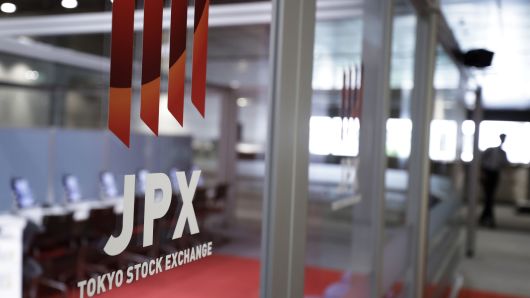Asia markets lower amid renewed US-China trade concerns
05 August, 2018

Asia markets fell on Thursday, following an overnight mixed session in the U.S. as renewed trade concerns offset strong gains in tech.
In Australia, the benchmark ASX 200 declined 34.8 points, or 0.55 percent, to 6,240.9 as the materials subindex fell 2.17 percent. Major mining names declined, with shares of Rio Tinto lower by 4.9 percent, Fortescue Metals down 1.84 percent and BHP lost 3.31 percent.
On Wednesday, Rio Tinto said its first-half profit rose 12 percent but that missed analyst estimates. The global miner also announced plans to buy back an additional $1 billion in shares, aiming for completion by the end of February 2019.
The heavily-weighted financial subindex was also down 0.25 percent as major banking names saw some declines. The National Australia Bank fell 0.61 percent.
Japan's Nikkei 225 fell 234.17 points, or 1.03 percent, to 22,512.53 while the Topix index declined by 17.67 points, or 1 percent, to 1,752.09. In South Korea, the Kospi was down 36.87 points, or 1.6 percent, at 2,270.2. Hong Kong's Hang Seng index declined 2.27 percent in afternoon trade at 3:11 p.m. HK/SIN.
Chinese mainland markets were also lower: The Shanghai composite declined 57.3 points, or 2.03 percent, to 2,767.23 and the Shenzhen composite fell 37.23 points, or 2.4 percent, to 1,512.04.
The Trump administration announced it is looking at the possibility of slapping a 25 percent tariff on $200 billion worth of imported Chinese goods — from the initial 10 percent announced earlier.
"This comes after China said that blackmail will not work on them and that they would retaliate against the U.S. if additional trade measures are imposed," said Daniel Hynes, from ANZ Research, in a morning note.
The Federal Reserve concluded a two-day meeting on monetary policy and left interest rates unchanged. The Wednesday decision was widely expected, but the central bank upgraded its view on the economy, calling it "strong."
"It appears that the 'strong' reference hardens a [September] hike hardening and leaving door open to another in [December] depending on data and unfettered by Trump's public strong-arming tactics," said Vishnu Varathan, head of economics and strategy at Mizuho Bank, in a morning note.
The U.S. dollar traded at 94.789 against the dollar index basket of currencies at 2:38 p.m. HK/SIN, rising from levels below 94.500 earlier in the week. The Japanese yen traded at 111.61 to the greenback while the Australian dollar fetched $0.7388.
Analysts at Singapore's OCBC Bank said in a note that they expect Asian currencies to "remain pressured" following the renewed concerns over U.S.-China trade.
Oil prices advanced on Thursday after falling about 2 percent overnight following a surprise increase in U.S. crude inventory that led to renewed concerns about oversupply. U.S. crude futures traded up 0.33 percent at $67.88 a barrel while global benchmark Brent added 0.61 percent to $72.83 at 2:40 p.m. HK/SIN.
U.S. crude inventories rose 3.8 million barrels in the previous week as imports jumped, according to the Energy Information Administration. The market was expecting a decrease of 2.8 million barrels.
In corporate news, Singapore's largest lender DBS Group reported a 20 percent jump in net profit for its second-quarter earnings, but that number missed market expectations. The bank's net profit came in at 1.37 billion Singapore dollars ($1 billion) in the three months ending June, versus a Reuters estimate of S$1.47 billion.
